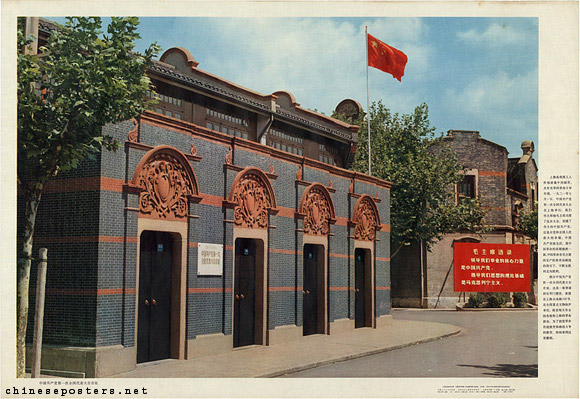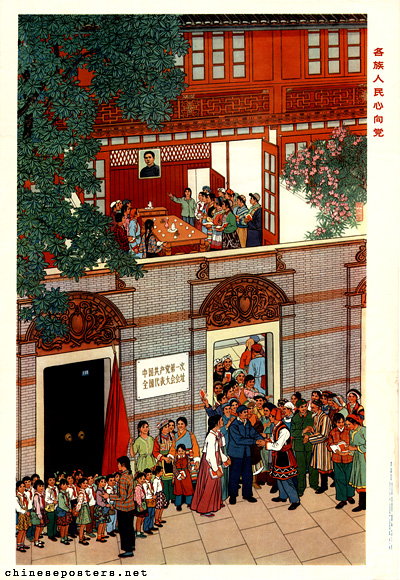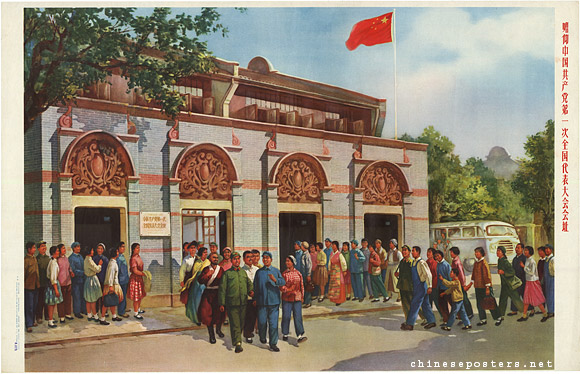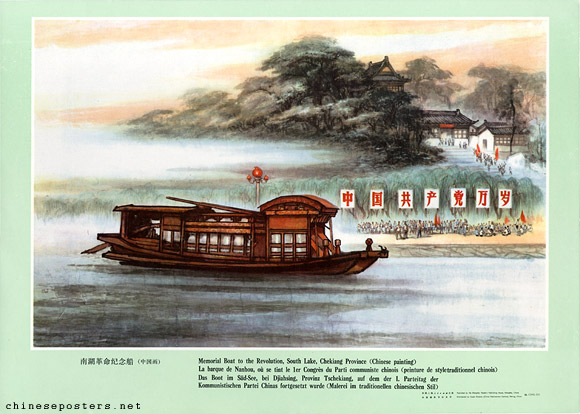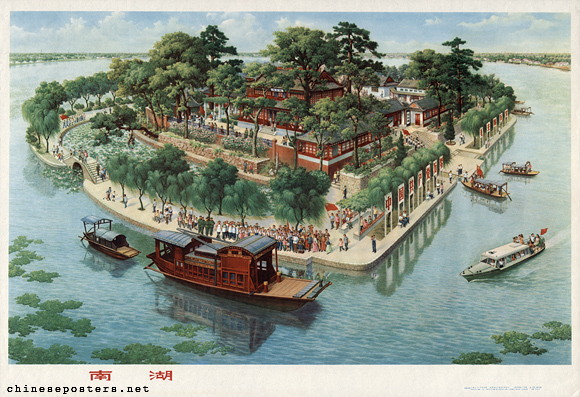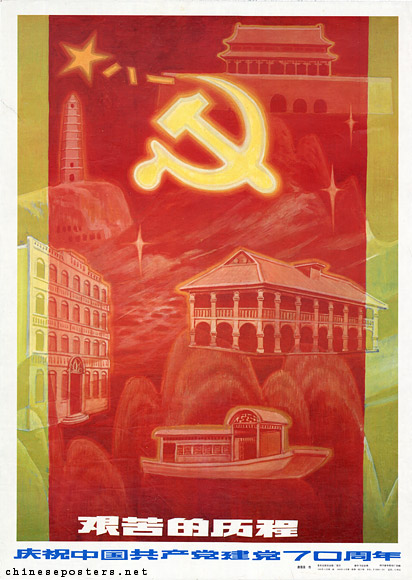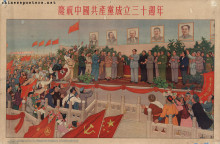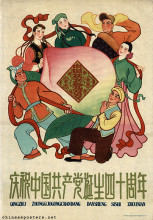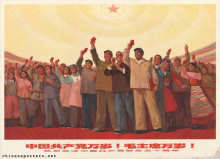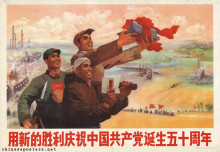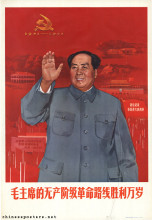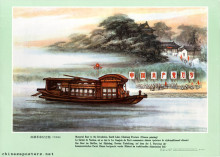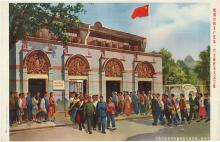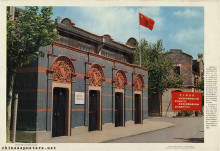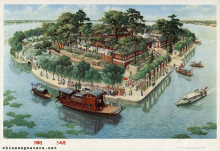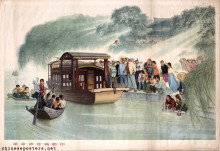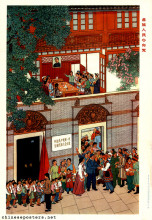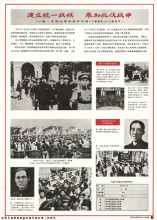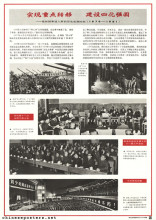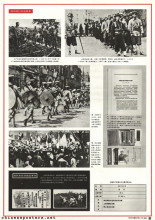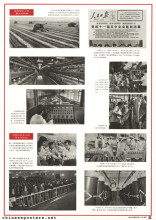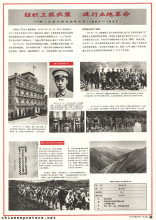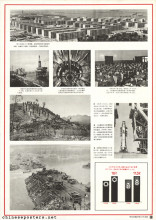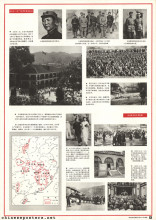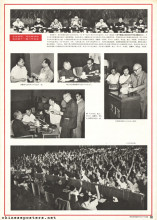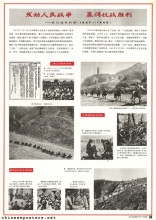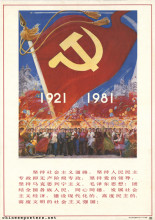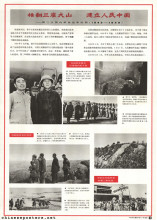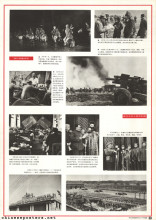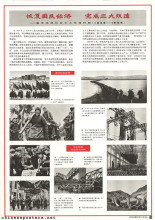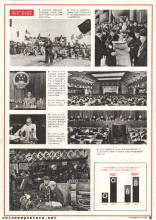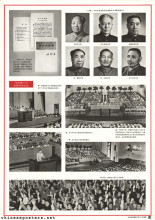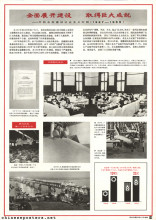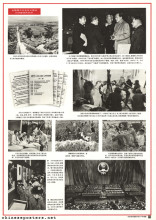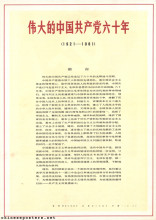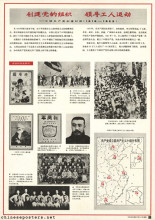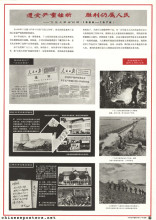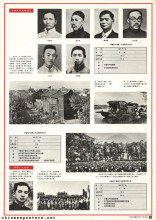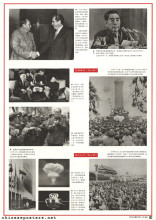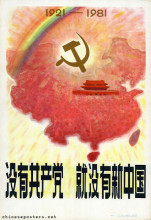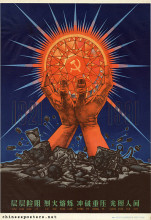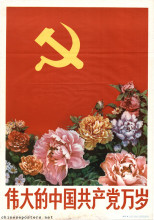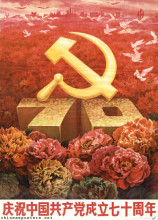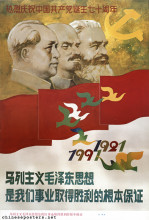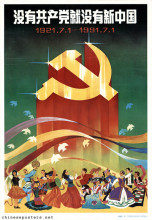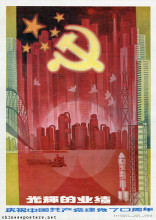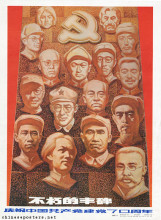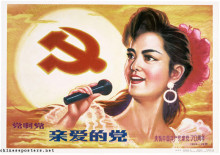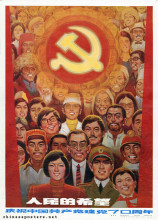The site of the first general meeting of the Chinese Communist Party, 1973
By official reckoning, based on the recollections of Mao Zedong himself, the Chinese Communist Party was founded on 1 July 1921. In reality, the actual founding took place some weeks later. This event capped earlier revolutionary and organizational activities that had emerged out of the May Fourth (New Culture) Movement of 1919. In the Autumn of 1918, the Head Librarian at Peking University, Li Dazhao, founded a study group (the "Society for the Study of Marxism") that explored Marx’s theories of communism. Mao Zedong, who worked in the library as an assistant to Li, was a member of this group. In the November 1918 issue of New Youth Magazine (La Jeunesse, 新靑年, Xin qingnian), Li wrote and article entitled "The Victory of Bolshevism", thus making young Chinese intellectuals aware of communism.
The hearts of people of all nationalities turn towards the Party, 1976
The Soviet Union, led by the Bolshevik Party, was just emerging from the 1917 revolution and beginning to establish itself at this time. Many Chinese intellectuals saw it as an example of how a communist state could be grounded on the basis of a former Imperial system, in a predominantly agricultural society. The Soviet Union was also looked upon favorably by Chinese nationalists (including Sun Yat-sen) and intellectuals, for renouncing all former Russian territorial concessions in China, as part of its rejection of imperialism. In 1919, the Soviets formed the Comintern (Communist International), an organisation set up to foster world revolution. By April 1920, the Comintern had sent a representative to China to assess the extent to which a revolution could be carried out successfully. On 3 June 1921, the Comintern representative and labor organizer Henk Sneevliet (Maring, 马林, Ma Lin) was sent to China to set up a Chinese Communist Party. He urged the various communist cells, geographically dispersed but already actively organizing and agitating, to join forces and become a national organization. These events coalesced at the First National Congress of the CCP, which was held on 23 July-2 August 1921.
This First National Congress was attended by 13 delegates who represented 59 party members: Li Hanjun, Li Da (the Shanghai delegates); Zhang Guotao, Liu Renjing (Beijing); Dong Biwu, Chen Tanqiu (Wuhan); Mao Zedong, He Shuheng (Changsha); Chen Gongbo, Bao Huiseng (Guangzhou); Wang Jinmei, Deng Enming (Jinan); and Zhou Fohai (Japan). Li Dazhao and Chen Duxiu were elsewhere and not present. It should be noted that the great majority of these early Marxists were from well to-do, upper middle class and intellectual families.
South Lake revolutionary memorial boat, ca. 1970
The Congress took place in a classroom in the Bowen Girls' School in the French Concession in Shanghai, at 106 Rue Wantz (presently No. 76 Xingye Road, Xintiandi). As the foreign Comintern representatives M. Nikolsky and Sneevliet drew too much attention of the Chinese detectives working for the French Concession police, the group moved to a houseboat on South Lake (Jiaxing, Zhejiang Province) to avoid being raided. There, on the boat, on 30 July, the CCP was officially established by the Chinese representatives (Sneevliet and Nikolsky were not present). Chen Duxiu was elected as general secretary, Li Da charged with propaganda and Zhang Guotao made responsible for organisation.
When studying the reports to Moscow and various other observations that Sneevliet made at the time, Mao Zedong only played a minor role in the proceedings. Sneevliet mentions a quiet young man in the background, expressing himself in a thick, difficult-to-understand local accent. The Chinese re-enactment of the event, in essays, tableaux vivants, posters, and other types of memoirs, diverges starkly: in these, Mao is very much in the foreground, taking an active part in the events.
Sneevliet was not impressed with this new and small communist party, and many in the Comintern agreed with him. A number of the Chinese participants at the Congress in turn held Maring and Nikolsky in low esteem and resisted the Comintern influence. To the Comintern, the Guomindang under Sun Yat-sen, although essentially a bourgeois party, looked better organized, more numerous and offered more potential to start a revolution; it had substantial links with the young Chinese labor movement that the CCP still lacked. Prior to the proclamation of the Chinese Republic in Guangzhou in May 1921, Sun Yat-sen had set up various unsuccessful governments in the south of China. Sun’s aim was to eventually control all of China but for this he needed political and financial support. In August 1922, Sun met with Comintern representatives, including Sneevliet, to discuss the reorganisation of the GMD and conditions for Soviet aid. These conditions included the merging of the CCP and GMD in a so-called "bloc-within" strategy, as the Soviet Union believed that the GMD, with the CCP acting as a junior party, could have a greater impact. This was adamantly rejected by Chen Duxiu who opposed collaborating with reactionary forces. On 26 January 1923, a manifesto was released, outlining the new alliance and stating its urgent goal as "national independence and unity". However, the manifesto also proclaimed that China was not yet ready for communism. The first congress of this collaborative entity, the United Front, was held on 20-23 January 1924. The CCP, as the junior partner, was allotted three out of the 24 seats on the Central Executive Committee.
Celebrate the 70th anniversary of the founding of the Chinese Communist Party - Arduous course, 1991
Denise Y. Ho, Curating Revolution –- Politics on Display in Mao’s China (Cambridge: Cambridge University Press, 2018)
Ming T. Lee, "The Founders of the Chinese Communist Party: a study in revolutionaries", Civilisations 18:1 (1968), 113-127
Samuel Y. Liang, The Past and Present of the CCP First Congress Memorial, Shanghai (2009)
Tony Saich, The Origins of the First United Front in China: The Role of Sneevliet (Alias Maring) (Leiden: Brill, 1991), 2 vols.
Tony Saich, Finding Allies and Making Revolution -- The Early Years of the Chinese Communist Party (Leiden: Koninklijke Brill, 2020)
Tai Wan-chin, "Chen Duxiu’s Conversion from a Liberal Democrat to a Marxist-Leninist: Motivations And Impact", Tamkang Journal of International Affairs (2007), 115-147
Didi Kirsten Tatlow, "On Party Anniversary, China Rewrites History", The New York Times, 20 July 2011
Michael Williams, "Sneevliet and the Birth of Asian Communism", New Left Review I/123 (1980), 81-90
Peter Zarrow, China in War and Revolution, 1895-1949 (Routledge, 2005)
Papercuts:
Sacred revolutionary spots - South Lake
Sacred Places of the Revolution - South Lake
Henk Sneevliet Papers:
The Dutchman Henk Sneevliet (1883-1942) was the Comintern's agent in China around 1921. He was involved in the founding of the Communist Party of China, and advised on its cooperation with the Guomindang. Among his papers are many important documents on Chinese communism in its early years. Sneevliet used the pseudonym Maring, transcribed in China as Ma Lin (马林)
- Inventory Henk Sneevliet Papers (Dutch text)
- Henk Sneevliet, Mind and Heart for Revolutionary Socialism in Europe and Asia (Documents, pictures, chronology)
Sixty years of the great Chinese Communist Party 1921-1981, 伟大的中国共产党六十年 1921-1981
Celebrate the 70th anniversary of the foundingof the Chinese Communist Party, 1991
China Media Project, The CCP’s 2021 Propaganda Blueprint, 13 April 2021
People's Daily (Renmin ribao, 人民日报), "A Hundred Years -- Illustrated Book" ( 百年图鉴, Bainian tujian) (A spectacular "rolling book" of 100 years of CCP history, published on WeiXin/Wechat. Some poster designs make a reappearance!), 1 July 2021
Yanyuan Apartment Service Center Student Self-Administration Committee (燕园公寓服务中心学生自管会), "Celebrate the 100th Anniversary of the Founding of the Party" (学生公寓“庆祝建党100周年”主题板报展) (Blackboard exhibition in the student dorms of Peking University, published on WeiXin/Wechat), 30 June 2021
